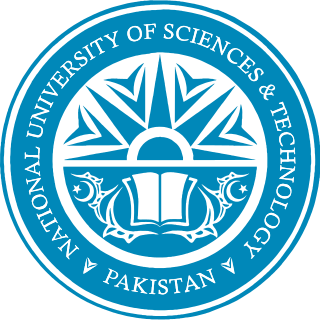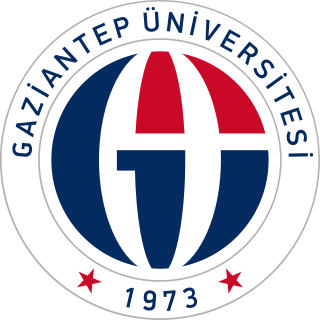
The National University of Sciences & Technology (NUST) is a Pakistani multi-campus public research university with its main campus in Islamabad, and other campuses in Rawalpindi, Risalpur, Quetta and Karachi. It offers degrees in multiple disciplines e.g. engineering, computer sciences, natural sciences, business studies, humanities, architecture as well as health sciences.

The College of Technology and Engineering (CTAE), is a public engineering college located in Udaipur, Rajasthan, India. It is one of the top ranking engineering institute of the state offering varied courses in engineering.

Mehran University of Engineering & Technology is a public research university located in Jamshoro, Sindh, Pakistan focused on STEM education.

The Pakistan Navy Engineering College, is a direct reporting detachment and a military engineering college located in Karachi, Sindh, Pakistan.
NUST School of Electrical Engineering and Computer Science (NUST-SEECS), formerly NUST Institute of Information Technology, is a constituent school in Islamabad, Pakistan. It was created on a self-financed basis in April 1999 as a constituent college of National University of Sciences and Technology, Pakistan (NUST). The formation of NUST was prompted by the growing need for high-caliber IT instruction in the country and the necessity for the institution to establish its own IT division.
The School of Engineering and Applied Science (SEAS) at the George Washington University in Washington, D.C. is a technical school which specializes in engineering, technology, communications, and transportation. The school is located on the main campus of the George Washington University and offers both undergraduate and graduate programs.

Gaziantep University is a public university in Gaziantep, Turkey. Gaziantep University is one of the best universities in Turkey. It has 20 faculties with a strong emphasis on scientific and technological research.

The Schulich School of Engineering is the accredited engineering school of the University of Calgary located in Calgary, Alberta, Canada. It currently has 4,610 enrolled students and over 150 faculty members. The school offers seven engineering degree programs.

The Khajeh Nasir Toosi University of Technology is a public research university in Tehran, Iran. It is named after medieval Persian scholar Khajeh Nasir Toosi. The university is considered one of the most prestigious institutions of higher education in Iran. Acceptance to the university is highly competitive, entrance to undergraduate and graduate programs typically requires scoring among the top 1% of students in the Iranian University Entrance Exam.

Assam Engineering College, established in 1955, is located in Guwahati. It is the first engineering college of Assam and is affiliated to Assam Science and Technology University. AEC has been the hub of many academic and supplementary activities in Assam. It is a public college run by the state of Assam. While the majority of students are from Assam, there are fixed quotas for students from neighbouring states. The college is approved by the All India Council for Technical Education AICTE.

The College of Electrical & Mechanical Engineering (CEME) is a constituent college of the National University of Sciences and Technology, located in Rawalpindi, Pakistan. The campus is on the main Peshawar Road, near the M-2 motorway terminal.
The University of Santo Tomas Faculty of Engineering, or UST-Eng, is the engineering school of the University of Santo Tomas, the oldest and the largest Catholic university in Manila, Philippines.

The Herbert Wertheim College of Engineering is the largest professional school, the second largest college, and one of the top three research units at the University of Florida. The college was founded in 1910, and in 2015 was named in honor of Herbert Wertheim – a serial inventor, philanthropist and UF Distinguished Alumnus. Located on the university's Gainesville, Florida campus, the college is composed of nine departments, 15 degree programs, and more than 20 centers and institutes. It produces research and graduates in more than a dozen fields of engineering and science including: aerospace, agricultural, biological, biomedical, chemical, civil, coastal, computer, computer science, digital arts, electrical, environmental, industrial, materials, mechanical, nuclear, and systems.
The FAMU-FSU College of Engineering is the joint college of engineering of Florida A&M University and Florida State University, the only such joint college of its kind in the United States. The joint college was established as a joint program serving two universities in Tallahassee, Florida: The Florida Agricultural and Mechanical University, which received recognition from the National Academy of Sciences and the National Academy of Engineering in 2010 for ranking number one as the institution of origin for African Americans earning Doctorates in Natural Science and Engineering; and, Florida State University which has gained worldwide recognition for its extensive graduate and research programs. The college is located less than three miles from either university.
The College of Engineering and Applied Science is the engineering and applied science college of the University of Cincinnati in Cincinnati, Ohio. It is the birthplace of the cooperative education (co-op) program and still holds the largest public mandatory cooperative education program at a public university in the United States. Today, it has a student population of around 4,898 undergraduate and 1,305 graduate students and is recognized annually as one of the top 100 engineering colleges in the US, ranking 83rd in 2020.
Lalbhai Dalpatbhai College of Engineering, is a state college located in Ahmedabad, Gujarat, India.
The Northeastern University College of Engineering(COE) is the engineering school of Northeastern University in Boston, Massachusetts. It offers Bachelor of Science (BS), Master of Science (MS) and doctoral degrees, as well as graduate certificates, in a variety of engineering fields, as well as undergraduate and graduate degrees in interdisciplinary and engineering fields. It is by the accredited by the Engineering Accreditation Commission of ABET

Indian Institute of Technology Tirupati is an autonomous engineering and technology education institute located in Tirupati, Andhra Pradesh. Initially mentored by IIT Madras, Tirupati is a 3rd generation IIT is located in Yerpedu. The institute has a size of 539 acres, including a proposed research park. The Foundation stone for IIT Tirupati was laid by the Union Minister Smriti Irani and the then Union Minister and former Vice President of India M.Venkaiah Naidu and the then chief minister of Andhra Pradesh N. Chandrababu Naidu.

The College of Engineering is a college within the University of Notre Dame. The Dean of the College of Engineering is Patricia J. Culligan, Ph.D. Its graduate school for Engineering is ranked #47 in the USA and #15 for undergraduate.
NIU College of Engineering and Engineering Technology was established in 1985 and offers ABET and ATMAE accredited programs in engineering and engineering technology. The college offers degree programs in electrical engineering, mechanical engineering, industrial and systems engineering, engineering technology, and industrial technology.












